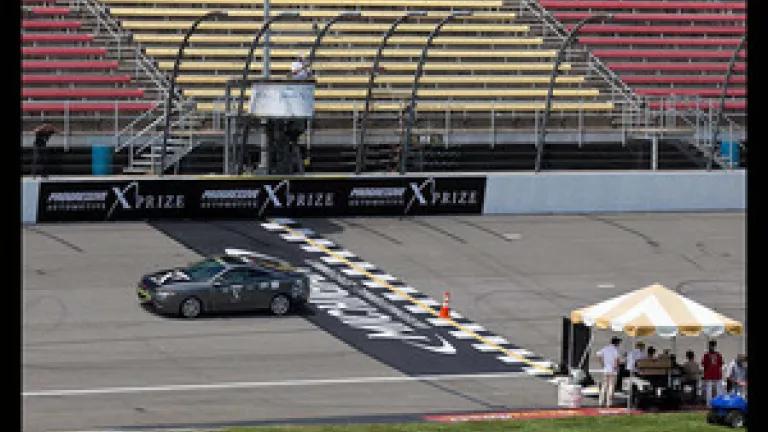
Entrepreneurs are busy demonstrating ultra efficient and clean car technologies for real-world performance. Last week, I had the pleasure of observing part of the Knockout Stage of Progressive Automotive X-Prize at the Michigan International Speedway. Teams are competing for part of a $10 million dollar award for the best performing and most marketable vehicle that travels the equivalent of at least 100 miles per gallon. The competition is demonstrating that we have the know-how and technology today to dramatically cut our oil consumption.
The Auto X-Prize competition is in the home stretch. Due to the demanding requirements less than one third of the original 43 entrants is still in the game. In addition to going 100 miles on a gallon of gasoline (or its energy equivalent from another source), the teams must demonstrate that their vehicles are safe to operate at competition speeds and meet thresholds for range and pollution emissions. The car designs must also be accompanied with a realistic plan for manufacturing and marketing. Last week, twenty-six teams entered the Knockout Stage but only twelve survived to move to the Finals, which starts later this month.
The $10M prize is pennies compared to some investments by large automakers but it is a great motivator for the small outfits of X-Prize innovators. Tight competition timelines are pushing advanced technology development and shortening feedback cycles. Lots of trial and error means that evaluation of technology options is done in parallel instead of in series. The innovators are also exploring a variety of technologies including advanced materials, ultra-efficient combustion engines, electric and hybrid power trains and new vehicle configurations.

Teams are competing to get noticed. A successful entrant in the competition may not have their exact vehicle brought to market, but their high efficiency technology will gain the attention of the auto industry. Recent investments by auto giants Toyota and Daimler in electric vehicle startup Tesla Motors are proof that innovators can help bring more efficient cars to the mass market. Incorporating fuel-sipping designs into the mainstream is critical for dramatically reducing our oil dependency (cars and trucks are responsible for over 60 percent of national oil demand).
As part of comprehensive climate and energy legislation, we need national requirements for cutting our oil dependence, with clear targets for 2020, 2030 and future years. The requirements create the ‘prize’ for entrepreneurs and innovators that rise to meet the challenge. Instead of continuing the risky hunt for more oil deep off our shores, we can tap American ingenuity to cut our oil dependence and keep our environment clean for future generations.
